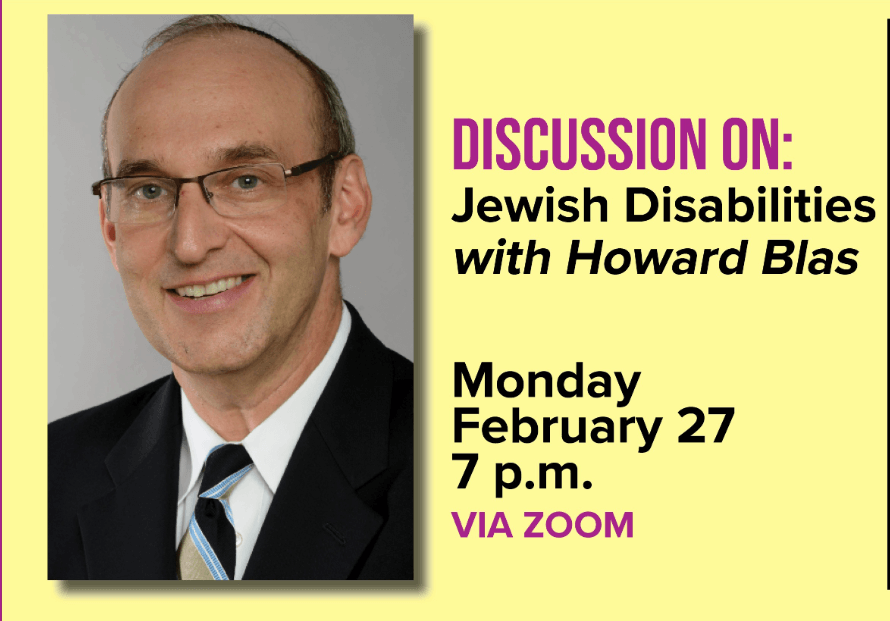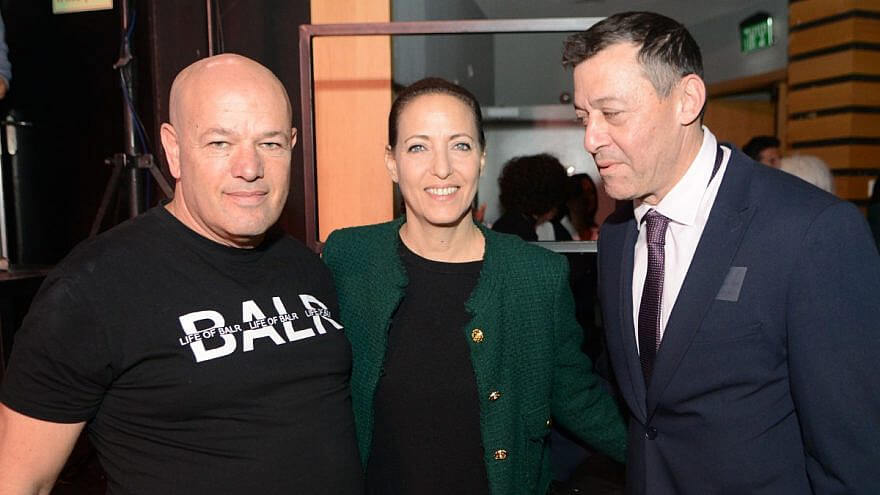Howard will be joining a panel of Tikvah Ramah participants, alumni and professionals to discuss the Tikvah Program throughout our Ramah camps. Come learn about the new Tikvah Program at Camp Ramah in the Berkshires. Register here:
Howard Will Be Facilitating A “Discussion On Disabilities” On Zoom For The JCC Of Greater New Haven On 2/27.
Monday, February 27, 2022 | 7:00 PM
Exclusively Via Zoom
Disabilities aren’t always visible but they are still real. Howard Blas holds masters degrees in both Social Work and Special Education. He has dedicated his career to supporting those with special needs. Part of that support is working with the communities in which those with special needs engage.
He currently serves as director of the National Ramah Tikvah Network of the National Ramah Commission. In this capacity, Howard works with Ramah camps as they include and support campers with disabilities. Howard has led five Tikvah Ramah Israel trips and served as group leader for three Shorashim Birthright Asperger trips to Israel.
There is no one better suited to lead the discussion on Jewish Disabilties. Register today.
Fourth Israeli Hackathon Develops Tools For Those With Autism
Original Article Published On The JNS
Rimon Tubin, the founder of HackAustism, tells JNS the Start-Up Nation ought to be able to aid those with disabilities.
“I could have been rich,” Rimon Tubin tells JNS. “But I am enriched.”
Tubin worked in data and project management at Bank Hapoalim for 15 years before becoming chief technology and innovation officer at Pangea IT, a digital identity, services and security company. In January 2021, he quit to run HackAutism, where he is “founder, dreamer and performer.”
He decided to devote his professional life to the cause that was at the forefront of his personal life. His 22-year-old son Yuval is on the autism spectrum and Tubin wanted to help Yuval and others with autism worldwide, so he created HackAutism, whose mission is to encourage and facilitate the creation of innovative technologies to help people with autism and their families.
By some estimates, one in 44 children is on the autism spectrum. Tubin believes 200,000 Israelis have autism.
“If the Start-Up Nation is so good at technology, entrepreneurship and innovation, why can’t people with disabilities also benefit?” he asked.
Tubin seems to be seeing progress each year, particularly in the annual hackathon, which is now in its fourth year. So far, the hackathons—24-hour entrepreneurship competitions focusing on solving autism-related challenges—have produced 42 ventures, 15 of which have raised initial funding.
The annual process includes the hackathon, a startup accelerator and a demo day, with winners going on to incubator and investor evenings. What begins as 100 ideas gets winnowed down to 25 (the “semifinals”) at the hackathon.
Participants from various disciplines sit at a roundtable and think jointly about a challenge. After that, they present a product or service to the judges. Of the 25, 10 reach the finals, where judges then select three winners.
“The goal is for these three to raise funds and establish companies,” Tubin said.
This year, first place at the events, held recently at the College of Management Academic Studies in Rishon Letzion, went to Dive, an artificial intelligence platform that helps employers identify and hire workers with autism. Cristalix, a personalized, virtual, cognitive behavioral therapy platform to treat social and intellectual difficulties in children and adolescents won second place. And third place went to It’s Time To, which helps autistic children navigate stressful transitions.
The competition judges included academics and entrepreneurs, as well as Lihi Lapid, the president of SHEKEL, a community organization for people with special needs. She and her husband, Israeli opposition leader Yair Lapid, have a daughter with autism.
Yuval Wagner, founder and president of Access Israel, which promotes accessibility and inclusion, was one of this year’s judges.
Life-improving technologies
“Access Israel chose to help the HackAutism organization and its founder, Rimon, because this organization focused on technologies and innovation specifically focused on solutions for autism,” Wagner told JNS. “We believe that the HackAutism hackathons and accelerators will bring life-improving technologies for people with autism.”
HackAutism also raises awareness about autism.
“Over the years, thousands of people have been involved in HackAutism. They include judges, mentors, volunteers and more,” Tubin told JNS. “Some had come into contact with autism in the past and were happy to use their knowledge, experience and entrepreneurship to help. Others had not been involved with people with autism and became involved through their participation.”
Tubin hopes, with support from the Foreign Ministry, to create an international HackAutism.
Benny Alon, CEO of the College of Management Academic Studies, was also a judge this year. At the event, he announced the expansion of the cooperation between the college and HackAutism.
“For the first time an innovative academic course for managers, the Start-Up Nation incubator, will be launched at the college, which will focus on entrepreneurship and technological innovation for people with disabilities,” he said. The course will be open to students from all disciplines, and will involve development of a product, he said.
Tubin always remembers that HackAutism began with inspiration from one person, his son.
“When Yuval was born in 2000, I told him that he was my gift to the world. When he was diagnosed with autism in 2008, we were advised to give him as much love as possible,” he told JNS.
There are challenges, but Tubin remains focused on doing what he can to help his son and others who have autism.
“I remain the father of a young child and will remain so forever,” he said. “We are not always asked if we want to do something or not. Sometimes we must live with it, or learn to live with it.”
The Abraham Accords of Tennis
Original Article Published On The JNS
The Abraham Accords have made a major impact on international relations in the Middle East. They are also proving an ace for Israeli tennis.
Last month, young players and coaches from the Israel Tennis & Education Centers flew to Bahrain—the nonprofit’s second trip to the island kingdom, with which Israel normalized relations in Sept. 2020.
The Abraham Accords impacted the centers (ITEC) both domestically and abroad. First, ITEC decided after the accords debuted that its vision ought to include all Israeli kids. That included Arabs in Israel, who also ought to have “the chance to be winners in life through tennis,” Erez Vider, the group’s CEO, told JNS.
ITEC enlisted Alam Ibrahem, a resident of the Druze village Sajur in northern Israel, as Arab society coordinator to launch tennis programs in Arab communities.
At first, Ibrahem was nervous about teaching tennis, but Vider assured him that other ITEC staff, including coach Ronen Morali, would handle the tennis. Ibaham’s job was to teach the ITEC leadership and staff about Arab society.
“It is win-win,” Vider told Ibrahem. “Ronen knows how to teach tennis and you know the Arab mentality.”
Working with Israeli-Arab communities builds upon ITEC’s nearly five decades of work trying to strengthen Israeli society and foster piece through the sport. The nonprofit’s approach blends tennis playing, education, mentorship and support services for more than 7,000 children each week.
The nonprofit’s programs currently reach Arab, Bedouin, Christian, Druze and Jewish kids in Arad, Haifa, Jaffa, Jerusalem, Kiryat Shmona and Tiberias. Its Abraham’s Bridge empowers the next generation of Arabs to lead in their communities.
In a period of violence and unrest in May 2021, ITEC found its bonds were deep enough to host partners from Tayibe, one of Israel’s largest Arab cities, in its Ramat Hasharon headquarters for a day of cross-cultural discussion.
Again in Ramat Hasharon, ITEC leaders and colleagues from the Bedouin city Rahat convened in June 2021 for a partnership forum.
“The goal of Abraham’s Bridge is to help build a stronger society in Israel. At the core of that strength is human connection, which starts with our children–the next generation of leadership,” Vider told JNS. “We hope that providing children with opportunities to collaborate in a diverse setting will help nurture and celebrate new bonds that will lead to a better future for all.”
After doing some research—and with a bit of luck—Ibrahem, who had his sights set overseas, secured the phone number of Khalid Yusuf Ahmed Aljalahma, Bahrain’s ambassador in Tel Aviv. Ibrahem introduced himself and asked for a meeting.
“He visited my house with his family and children, and that’s how the relationship started—on a family level and not only in the field of tennis,” Ibrahem told JNS.
Last July, the ambassador visited ITEC headquarters. “From the first moment we met, there was an indescribable, strong click,” Ibrahem said.
“He came to Ramat Hasharon and saw Arabs from Tayibe with the Israeli flag, and Israeli kids with the Bahraini flag,” Vider said. “We are ambassadors of peace. He was emotional and impressed.”
“There is no limit to the fields in which Israel and Bahrain can build common
bridges, on which to walk together,” Aljalahma said.
The kingdom’s ambassador connected Ibrahem with the chairman of the Bahrain Tennis Association, and three months later, last October, Morali, the coach, joined an ITEC delegation to Bahrain. The group met the Bahrain Tennis Association chairman.
“They asked me to come for one week to train them for a Davis Cup event taking place in November,” Morali told JNS. “It was a very intense week, and a very productive week as well.” (The International Tennis Federation’s Davis Cup is a major team event; an Israeli team pulled off a come-from-behind victory against Latvia this month in Riga.).
The Israeli-Bahraini tennis bond has continued to yield fruitful volleys that score points.
Israeli coaches and players traveled to Bahrain last month to train with nine
local coaches, native-born Bahraini players and tennis-playing immigrants to Bahrain from the Philippines, Romania, Tunisia and Yemen.
Ido Samimiyan, 17, remains in touch with some of the new Bahraini friends he made on the trip and is excited some may visit him in Israel soon.
“They were good players and nice kids. We really bonded,” he told JNS. “We played together, ate together and played Davis Cup-style tennis.” (They spoke in English, but not about politics. Samiyan was proud of winning “by a lot,” and in awe that his new friends lived in a kingdom.)
Vider hopes ITEC will be able to offer scholarships to two Bahrani players to train in Israel.
“Sport is different from politics. You bring kids on a court, and they don’t care about color or religion,” he said. “It is amazing how fast they forget who they are playing with.”



